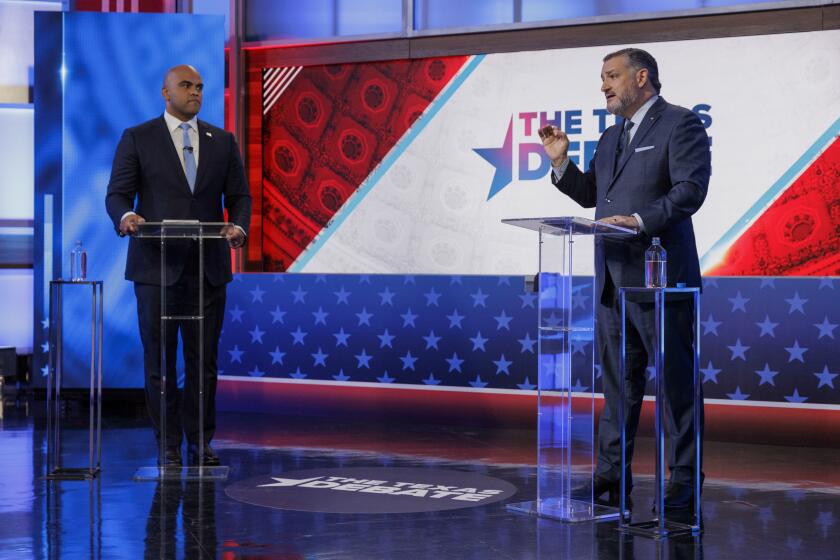Pope Meets Arafat, Urges Negotiations to Settle Mideast Crisis
Exchanging Yuletide presents with a visiting Yasser Arafat, Pope John Paul II on Friday appealed for negotiations as “the only means of finding an equitable solution to conflict in the Middle East.”
John Paul met for 20 minutes with the chairman of the Palestine Liberation Organization and four of his aides in the library of the papal apartment here.
Arafat gave the Pope a wood and mother of pearl Nativity scene carved in Bethlelem. The pontiff gave Arafat a book about the Vatican, according to papal spokesman Joaquin Navarro.
“The Pope expressed the hope that both peoples (Israeli and Palestinian) would soon see the beginning of a real process of understanding and of peace, which would finally put an end to their suffering and their fears,” Navarro said in a statement after the meeting.
Navarro said that John Paul had agreed to Arafat’s request for their second meeting in six years “in the willingness to encourage dialogue, the only means of finding an equitable solution to conflict in the Middle East excluding all recourse to arms, to violence, and, above all, to terrorism and reprisal.”
Arafat also met for what he called “positive, constructive and important talks” with Italian leaders here Friday as part of a PLO campaign to drum up support in West Europe for a Middle East peace conference and a Palestinian state. The Italian government supports a conference and PLO participation but has stopped short of formal recognition of the Palestinian state proclaimed Nov. 15.
Speaking at a press conference to conclude his one-day Rome visit, Arafat seemed, in response to a question, to accept speculation, still unsupported by hard evidence, that a bomb was responsible for Wednesday’s crash in Scotland of a Pan American 747, taking 258 lives.
Cautioning that “we should not base our judgments on rumors,” Arafat went on to say: “This is an inhuman, criminal action which we condemn. It is against our peace mission. It is not against a state. It is directed against humanity as a whole; another proof that we should all fight against terrorism.”
Arafat’s renunciation of terrorism and his recognition of Israel’s right to exist were instrumental in winning a U.S. decision last week to resume talks with the PLO after 13 years.
Monumental Traffic Gridlock
Heavily guarded by siren-blaring outriders, who, amid Rome’s pre-Christmas rush, fueled a monumental traffic gridlock, Arafat wore his trademark olive-colored uniform and checkered black-and-white headdress to his audience with John Paul. Arafat spoke Arabic. The Pope responded through a monsignor-interpreter from the Vatican diplomatic corps.
Receiving the Palestinian leader in the library where he generally greets heads of state and other dignitaries, the pontiff stressed the Vatican’s longstanding “two-states” policy, which the PLO now also accepts.
“The Holy Father reiterated that he was profoundly convinced that the two peoples had an identical fundamental right to their own homelands in which they could live in liberty, dignity and security, in harmony with the neighboring peoples,” the Vatican statement said. Palestinians and Israelis, the Pope said, must live in peace “in that land where the Prince of Peace was born.”
No details were forthcoming, but Navarro said Arafat had discussed recent Middle East developments and responded to papal inquiries about them.
Obviously pleased at the way his day had gone, Arafat told a press conference before leaving Italy for an undisclosed location: “I have explained to His Holiness the suffering my people are facing under occupation. I have asked His Holiness to pray for them; and that peace may prevail in the Holy Land.”
The first encounter between John Paul and Arafat, in 1982, was markedly more reserved and occurred in a sitting room away from the papal apartments. The PLO remembers that meeting as a cornerstone in its drive for international recognition. To mute fierce criticism of it from Israel and Jewish organizations, the Vatican quickly issued a statement decrying terrorism.
Friday’s session was warmer, almost routine, by Navarro’s account. It raised no stir of protest here, although the Associated Press in Jerusalem quoted a Foreign Ministry spokesman as saying, “Peace in the Holy Land can hardly be served by such a meeting.”
More to Read
Sign up for Essential California
The most important California stories and recommendations in your inbox every morning.
You may occasionally receive promotional content from the Los Angeles Times.









